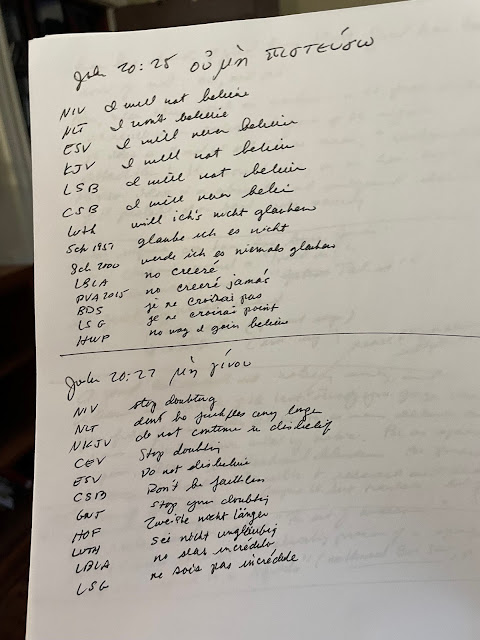A good Bible reader will notice, analyze, and remember details of the text. Read the passage multiple times. Let your gaze sweep over your field of vision. Pay attention to as many details as you can. Write down what you notice. Be as specific as possible. Avoid inattentional blindness. Be present. Minimize distractions. Be willing to research and learn. Compare the best translations. Ask good questions. Summarize your results.
While reading John 20 this morning, two details in the text stood out to me. Both of them involved well-known Greek constructions. One of them is found in John 20:25. "I will not believe," says Thomas the Doubter. Please note that Greek has two words for "not": ou and mē. When these words are combined to form ou mē, the result is an intensified form of the negation. The idea is "not at all," or "by no means," or "certainly not." Attach this to the aorist tense, as we have here in John 20:25, and the idea is one of an absolute and unequivocal denial of the probability of an event ever happening.
Then, in John 20:27, I noticed Jesus' command to Thomas: "Do not doubt." Now, Greek imperatives have two basic forms:
- Ongoing/Marked aspect = "Hold on to it!"
- Simple/Unmarked aspect = Take it!"
In Greek, this would read:
- lambane
- labe
Here in John 20:27, where Jesus says, "do not doubt," we've got the ongoing aspect along with the word "not." If the context allows for it, the construction will be understood as something like "stop doing it."
It's now time to see how the various versions handle these two verses.
For John 20:25, the ou mē in the Greek is nicely reflected in the ESV's "I will never believe," Schlachter's "werde ich es niemals glauben," and even the Hawaiian Pidgin's "no way I goin believe." As for John 20:27, what do you think of these renderings?
- NIV = stop doubting
- NLT = don't be faithless any longer
- NKJV = do not continue in disbelief
- GNT = Stop your doubting
- Hoffnung für Alles = Zweifle nicht länger
These are just two of the many details that made me stop and think today. Bible reading has been called "the art of awareness." Robert Traina refers to it as "the absorbing process of a sponge when it is exposed to a liquid." Bible reading is not a privilege for the pious nor the art of a chosen few. It is simply welcoming God's word into your mind. As you read the words of Scripture, Jesus is tapping at the door of your heart. Open it. Welcome him in. Soak in his truth in all its beauty and grandeur.
